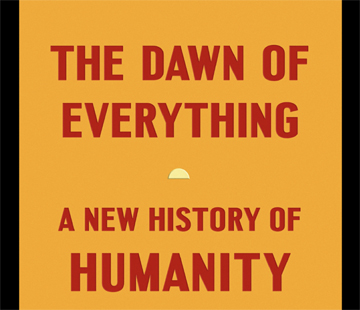The Dawn of Everything: A New History of Humanity by David Graeber and David Wengrow started out to write a book about the origins of social inequality, according to the authors (an anthropologist and an archeologist). However, they realized that they were asking the wrong question or perhaps asking such an ill-formed question that an answer was not possible.
What is the book about, then? Here’s how the authors describe what they want to explore:
“We are projects of collective self-creation. What if we approached human history that way? What if we treat people, from the beginning, as imaginative, intelligent, playful creatures who deserve to be understood as such? What if, instead of telling a story about how our species fell from some idyllic state of equality, we ask how we came to be trapped in such tight conceptual shackles that we can no longer even imagine the possibility of reinventing ourselves?”
The authors want to sweep away towering myths, some of which have stood for centuries, such as Rousseau’s idyllic, egalitarian Garden of Eden myth, Hobbes’ idea that the state is the only thing that keeps humans from destroying each other, the idea that increasing complexity and scale must inexorably lead to hierarchies and dominance structures, and the inexorable march of “revolutions” (agricultural, industrial, etc.) from which there is no escape and no going back.
The authors bring in new scholarship and investigations of archeological evidence as well as new interpretations of old accounts of a variety of human societies. They also realize that the language that we use to describe the way the humans organize themselves is inherently biased, such that certain questions are difficult to ask and certain answers are hard to explain. This leads them to break down what is meant by freedom and dominance into essential, basic elements without having to be hamstrung by concepts like “state”, “class”, etc.
They point to three basic forms of social freedoms:
- The freedom to move away;
- The freedom to disobey; and
- The freedom to shape new social realities or shift back and forth between different social realities.
We have lost these freedoms or given them up to be a part of the Western idea of nation-states. How did this happen (a central question in the book)?
The authors propose that social power can be exercised via three different channels or paths:
- Control of violence (e.g., police, armies);
- Control of information (e.g., ritual knowledge held only by an elite, bureaucracies); and
- Individual charisma (e.g., monarchs, elected politicians).
Any one or combinations of these paths can be the basis for a political structure. Some political structures (but not all) from the past are what we today would recognize as states, in which combinations of these elements (though not necessarily all three at once) are the basis for social power.
At this moment in history, we are stuck, the authors propose, in states employing all three principles of domination in ways that deprive individuals of the basic freedoms. That is, do people have the freedom to travel? Only if they have enough money and somewhere to go. Do people have the freedom to disobey? Generally, not if they have a job that they need to keep. And, finally, the authors observe:
“If something did go terribly wrong in human history – and given the current state of the world, it’s hard to deny something did – then perhaps it began to go wrong precisely when people started losing that freedom to imagine and enact other forms of social existence, to such a degree that some now feel this particular type of freedom hardly even existed, or was barely exercised, for the greater part of human history.”
Ultimately, the authors don’t have specific ideas about how humans might become “unstuck”, except to suggest that huge social upheavals might allow people to imagine other forms of social existence. There is not a prescription about how to put that into practice in the end. Even so, the book provides novel arguments from many millennia of human experimentation. Change will surely not be possible until we can see clearly without being blinded by myths, half-truths, and stifling language.
The Dawn of Everything is long about 700 pages or, if you listen to the audiobook as I did, about 24 hours long. The time will be well spent.

Comments are closed